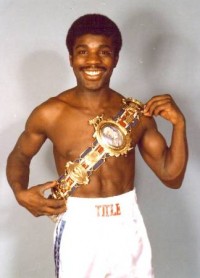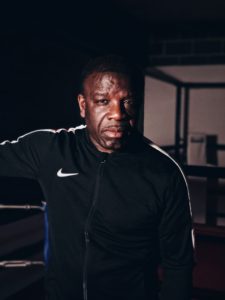Ringside Report Looks Back At Boxer Clinton Mackenzie
 By Donald “Braveheart” Stewart
By Donald “Braveheart” Stewart
The immigrant population of the United Kingdom has done to boxing what the immigrant population in France has done to football. It has provided us with some exceptional sports people and Clinton Mackenzie, 36-14, 12 KO’s is a perfect example of this. Born, one of seven children in Jamaica, this light welterweight champion never forgot his heritage but has become such a piece of the fabric of British boxing life that his career has become just part of his boxing story.
His fighting story is incredible. A British and European champion he fought no fewer than 50 times and ended his career with a win! There’s clearly a lot to talk about.
McKenzie’s glittering amateur career culminated in the 1976 Olympics and he reigned three times as British light-welterweight champion, won not one but two Lonsdale belts outright and also captured the European title during a professional career that began in 1976 and ended in 1989.
In fact, the well-schooled southpaw saw and did pretty much everything except fight for a world title.
It all began when Clinton came to the UK when he was 7, so he had a proud sense of his heritage, being old enough to remember it when he stepped onto British soil. He had and has boxing in his blood, being the brother of a boxing world champion, Duke, father of Leon and adopted parent to another fighter in Angel.
Like his siblings, he was influenced by the love of boxing which his father had; three of his children became professional boxers. Clinton made his amateur debut at 11 in 1966. By 1976, he was the ABA champion and on the Olympic squad.
But it all could have gone very sour as that pathway to the Olympics was far from smooth. In a recent interview, he recalled, “The Olympics team was announced, and I wasn’t in. It was totally impossible. I’d done everything. I’d won everything. So why wasn’t I chosen?”
Why? Chris Davies, a Welsh fighter had his place. Davies’ father, John, was the manager of Team GB. The media entered a period of frenzy at this. Clinton recalled, “It caused uproar. I thought my dreams had been shattered. The Jamaican embassy even rang up, asking if I wanted to fight for [Jamaica].”
He did not fight for Jamaica and in the end, Davies was removed, and Clinton Mackenzie went to the Games. It took high level discussions for a decision that had already been settled in the ring.
A seven-man British boxing team including Clinton and included the likes of Charlie Magri, Pat Cowdell, Sylvester Mittee and Colin Jones went to Montreal.
The struggle had been worth it to get there but the results at the Olympics were no fairy tale as Mackenzie came up against the eventual gold medalist – a certain Ray Leonard – and lost at the last 16 stage. Again, Clinton was, in that same interview, honest in his assessment, ““I knew he’d won, but what an amazing experience to fight one of the greatest boxers who ever lived. We’ve met up since and Sugar Ray actually said to me: ‘If you’d believed a bit more in yourself you might have beaten me.’” That was quite a compliment.”
Indeed, it was and very deserved.
In October 1976, Mackenzie took the decision to enter the professional ring at the iconic British boxing venue, The York Hall, winning his first fight on points over eight rounds against Jimmy King.
Two years later he was in the ring to take the British title with a 10th round knockout of Jim Montague in Belfast. That night, Clinton was so overwhelmed by his achievement that he slept with the belt!
He held it for a year until losing it on points in February 1979 when he rematched Colin Powers at the Wembley Conference Center; a loss he avenged 7 months later. The British Boxing Board of Control ordered a rematch, but he had to see of Des Morrison in an eliminator, he won by half a point! In between he went to Las Vegas to fight Don Curry’s brother, Bruce which he lost over 10 rounds. His third fight with Powers, with his right eye almost closed by the 14th round, he won and remained the British champion all the way until 1984. Defenses included some notable battles, none more so than the absolute war he endured against Des Morrison which he won in January 1981 to take his first Lonsdale Belt outright.
By the time he had won a second belt outright he was to face a future world champion for the IBF in Terry Marsh. It was 1984 and the time had come for him to lose it. The background for it was the circus tent in which it was held, and these two lions served up a cracker. Unfortunately for Clinton, Marsh boxed beautifully and won by decision in a tactical fight that saw his grip on his title slip.
For all the titles at home, he never made it to fight for world honors. Why?
“I just couldn’t get a shot,” he was to reflect years later. “The Americans didn’t want to know me because I was a southpaw. There were only two versions of the world title at that time, and it was very hard to get a world title fight. It was very unfortunate. The closest I got was in 1984 — I was supposed to fight [then WBA junior welterweight champion] Johnny Bumphus. Then he decided he would make a voluntary defense against Gene Hatcher. Hatcher knocked him out and my title shot went down the drain. Hatcher didn’t want to fight me. And that was it.” In that same interview from 2014, Clinton reflected on a bright career much heralded by the likes of me with such honesty when he said, “The determination to survive until the end – that’s what boxing’s about and that’s life as well. You get rough times and sometimes you want to give up, but you have to go on until you get where you want to get.”
 Once retired Clinton struggled. You would not think it given the gyms he runs and the opportunities he gives to young people and his community. Retirement came in 1989 when he was knocked out in a European title fight but the brightness with which he shone was more than a beacon for others to follow. Outside the ring, businesses came and failed but he went back into it to provide such sparkling chances for the people around him and for that, he deserves to come out this pandemic with the opportunities he was giving to people intact, not just because of the fighter he was but also because of the 7 year old he grew from – someone who came to our country to improve it. Job nearly done.
Once retired Clinton struggled. You would not think it given the gyms he runs and the opportunities he gives to young people and his community. Retirement came in 1989 when he was knocked out in a European title fight but the brightness with which he shone was more than a beacon for others to follow. Outside the ring, businesses came and failed but he went back into it to provide such sparkling chances for the people around him and for that, he deserves to come out this pandemic with the opportunities he was giving to people intact, not just because of the fighter he was but also because of the 7 year old he grew from – someone who came to our country to improve it. Job nearly done.
[si-contact-form form=’2′]

